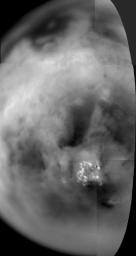
|
Titan’s Mottled Surface
- Click the image above for a larger view
- Full-Res JPEG (675 x 1274) (63.3 kB)
- Full-Res TIFF (675 x 1274) (781.0 kB)
Caption:
Shown here is a mosaic of Titan's south polar region acquired as Cassini passed by at a range of 339,000 kilometers (210,600 miles) on July 2. These images were acquired through special filters designed to see through the thick haze and atmosphere. The surface features become more blurry toward the limb, where the light reflected off the surface must pass through more atmosphere before reaching the camera. The bright spots near the bottom represent a field of clouds near the south pole. There are many strange dark and bright patterns on Titan's surface -- linear, sinuous and circular -- whose origins are not yet understood. The smallest features detected on the surface are about 10 kilometers (6 miles) wide.
Background Info:
The Cassini-Huygens mission is a cooperative project of NASA, the European Space Agency and the Italian Space Agency. The Jet Propulsion Laboratory, a division of the California Institute of Technology in Pasadena, manages the Cassini-Huygens mission for NASA's Office of Space Science, Washington, D.C. The Cassini orbiter and its two onboard cameras, were designed, developed and assembled at JPL. The imaging team is based at the Space Science Institute, Boulder, Colo.
For more information, about the Cassini-Huygens mission visit, http://saturn.jpl.nasa.gov and the Cassini imaging team home page, http://ciclops.org .
Cataloging Keywords:
| Name | Value | Additional Values |
|---|---|---|
| Target | Titan | |
| System | Saturn | |
| Target Type | Satellite | |
| Mission | Cassini-Huygens | |
| Instrument Host | Cassini Orbiter | |
| Host Type | Orbiter | |
| Instrument | Imaging Science Subsystem (ISS) | |
| Detector | ||
| Extra Keywords | Atmosphere, Grayscale, Haze | |
| Acquisition Date | ||
| Release Date | 2004-07-03 | |
| Date in Caption | ||
| Image Credit | NASA/JPL/Space Science Institute | |
| Source | photojournal.jpl.nasa.gov/catalog/PIA06109 | |
| Identifier | PIA06109 | |
